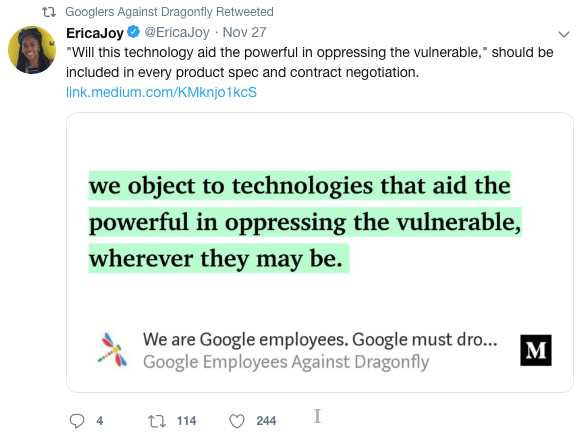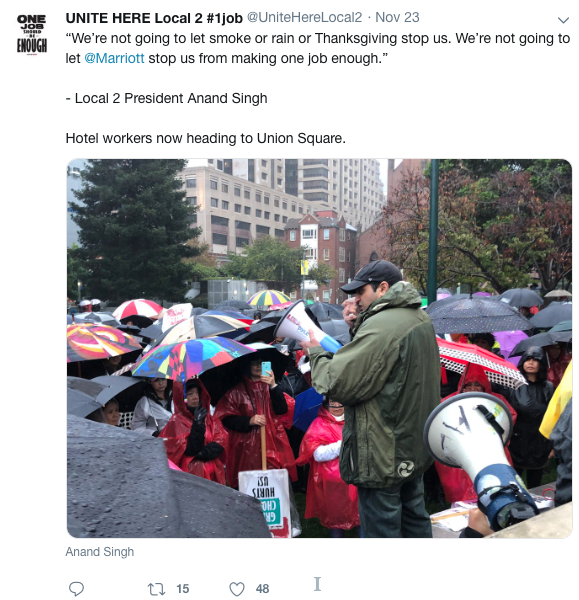Issue 27: Tech workers against imperialism
30 Nov 2018
The latest resistance by Google workers is a penned letter published on Monday opposing Dragonfly. The letter says it clearly: By building a censored search engine and handing over user data to the Chinese government, Google is complicit in oppression and human rights abuses; and we already know the ways Uyghurs, women’s rights advocates and students have been specifically targeted in those abuses.

An open letter by Google Employees Against Dragonfly / Source
The letter builds upon the multitude of tactics workers have undertaken in 2018 to protest their employers’ violent, imperialist business practices. A recent TWC analysis draws the line connecting the biggest tech worker uprising events of the past year:
Google workers protested against AI tech for drones, and other military contracts. Microsoft and Salesforce workers protested against contracts with ICE and border patrol. Amazon workers protested against the development of tech for domestic policing and surveillance.
Each protest resists different nodes of the same system of imperial violence.
It is no coincidence that around 50% of the undocumented migrants that are swept into the US immigration detention system — a process facilitated by the surveillance, data processing, and business process technologies developed by the tech industry — are refugees from Central America, fleeing levels of gang violence that rivals Middle Eastern warzones …
But just as the various institutions of imperialism are intertwined, so too are the fates of those impacted. Building on the fact that so many of our struggles are connected is necessary to build a broad-based and mass movement against imperialism. There are several ways that the current movement can be further developed.
The first and most important task is, of course, to continue to build worker power in the tech industry. We need to continue to engage in critical discussions with our coworkers about everything from basic workplace conditions to the ethical dimensions of how our labor is used, and the fact that by acting collectively, we can assert our own power in the workplace as rank-and-file workers. Managers and executives can blather on forever about ethical principles and human rights, but unless workers have the confidence and organization to challenge the traditional decision-making hierarchy of capitalism, corporations will always prioritize their bottom line, regardless of the human cost (case-in-point: the immediate results of the Google walkout). Indeed, corporate leadership at Microsoft and Amazon are digging in their heels on the issue of providing technologies to the US military.

Upcoming Events
Learning Club: Science for the People Archive ‘70-‘89
Saturday, 12/1 3PM at Omni Commons in Oakland
Meetup
Dynamex and Contractor Know your Rights Training
Thursday, 12/6 6:30PM at The Women’s Building in San Francisco
Meetup
Learning Club: Tech Ethics and Worker Power
Sunday, 12/9 2PM at Cambridge Public Library in Cambridge
Facebook
Forum: #MeToo and Worker Power
Tuesday, 12/11 4PM at MIT in Cambridge
TWC NYC Meeting
Tuesday, 12/11 6:30PM at Verso Books in New York
The Code of Conduct is in effect at all TWC events.
In The News
Amazon warehouse workers organizing along affinity lines of culture and religion in Minneapolis are the first known group to successfully get Amazon management to the bargaining table.
“A FitBit for how we work”, productivity-tracking screenshots and unreachable quotas tell of the advent of the software sweatshop and the billionaire visionary we have to thank for it.
The newest perpetrator in “AI snakeoil” is Predictim, an artificial intelligence company that claims to analyze prospective babysitter’s social media to reveal character attributes. In addition to being heavily criticized for faulty, inaccurate, discriminatory results, the service violates Twitter and Facebook’s surveillance policies.
”Tech companies shopping for real estate are asking local officials to sign NDAs — and cutting taxpayers out of the loop.”
Microsoft has won a $500 million contract to supply the US Army with augmented reality technology; a Microsoft spokesperson defended the contract, claiming that it will “help troops make more informed decisions”.
“Where did Google get the tens of millions of dollars it paid to Rubin and other senior executives accused of sexual misconduct? They got it from every time you worked late. Every promotion you didn’t get because they said there’s not enough budget, you have to wait. It’s from every contractor who came to work sick because they have no paid time off. These are conscious decisions that the company is making, and abusers are getting rich off of our hard work… We’re giving our feedback about what’s wrong through all of the official channels. We’re filling out the surveys every year. We are talking back in TGIF [all hands meetings] and asking these questions, and nothing is happening. But once we begin to find each other, and see each other all speaking out and all saying, fundamentally, the same thing, then the fear starts to go away. Once we start taking collective action, then we can’t be stopped.”
A Google contractor emboldened by the walkout speaks out about his experiences with race discrimination on the job.
“There may never be a better time to unionize your workplace.”
And an encouraging round up of Thanksgiving and Black Friday work stoppages:
For the third Thanksgiving in a row, Instacart delivery workers waged a soft strike to demand better pay. The strike was in part coordinated through Facebook groups, one of which has over 9,000 members.
Amazon workers in UK, Germany, Italy, Spain striked on Black Friday. One worker’s statement: “My doctor told me we are doing the equivalent of a marathon a day for five days straight at work. Not even professional athletes work that hard. I used to like to play soccer on the weekends and go hiking. I don’t have the energy to do that anymore. My knees hurt. My back hurts.” Amazon management responded by asking local police to make workers go back to their jobs.
Two months in, Marriott strikers have racked up another win with a contract in Hawaii. California hotels remain the final battleground, where workers outlasted last week’s toxic air, rain and holiday to continue 24/7 picket line coverage. Tech companies that are crossing the picket line by doing business and conferences at Marriott hotels while the strike is on include Apple, who is holding its December 8 Christmas party at the Palace, a Marriott hotel in San Francisco; and participants of An Event Apart, a UX conference held at the Westin St. Francis San Francisco. If you’re associated with either event, tell event organizers that you won’t attend as long as the strike is on. More info on why workers are striking is here, and follow @unitehere for updates.

@UniteHereLocal2 / Source
Song Of The Week
The Advanced Workers With The Anti-Imperialist Singers - You Was Dancin’ Need To Be Marchin So You Can Dance Some More Later On
Marchin in the streets
Rock it everyday
Crushed beneath our feet
Sock it to the state!
But this was an army of workers
Led by the science of revolution
An army of workers had grasped
the science of revolution
and when they said “party!”
they meant an anti-revisionist revolutionary communist party!’